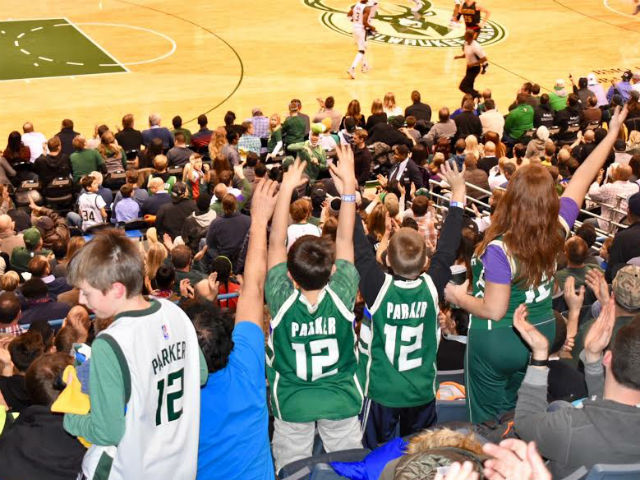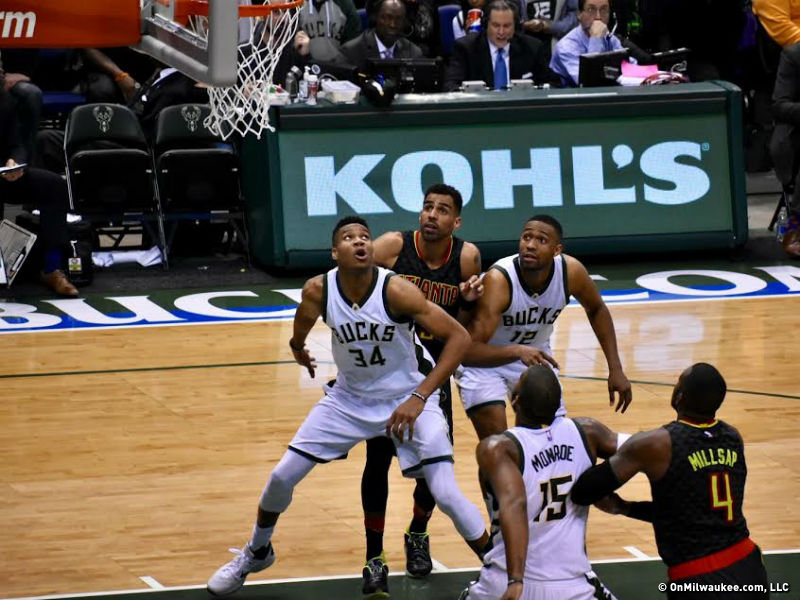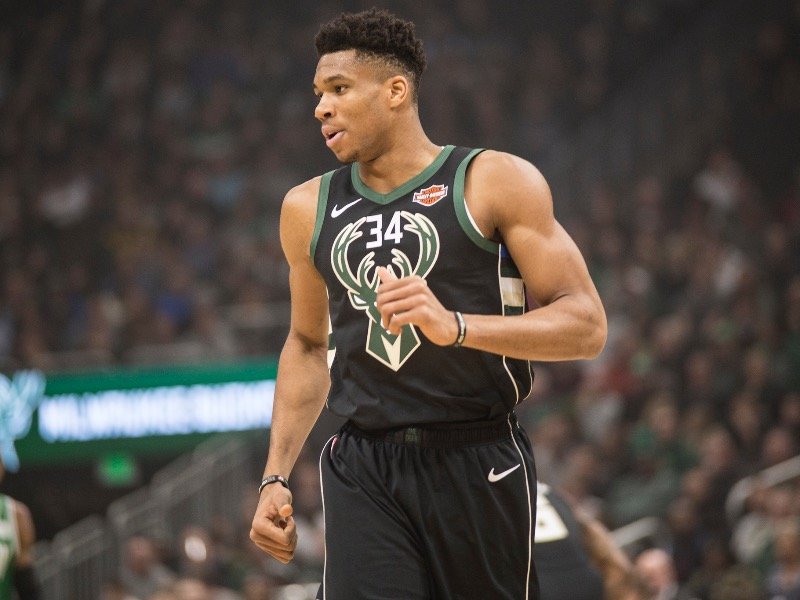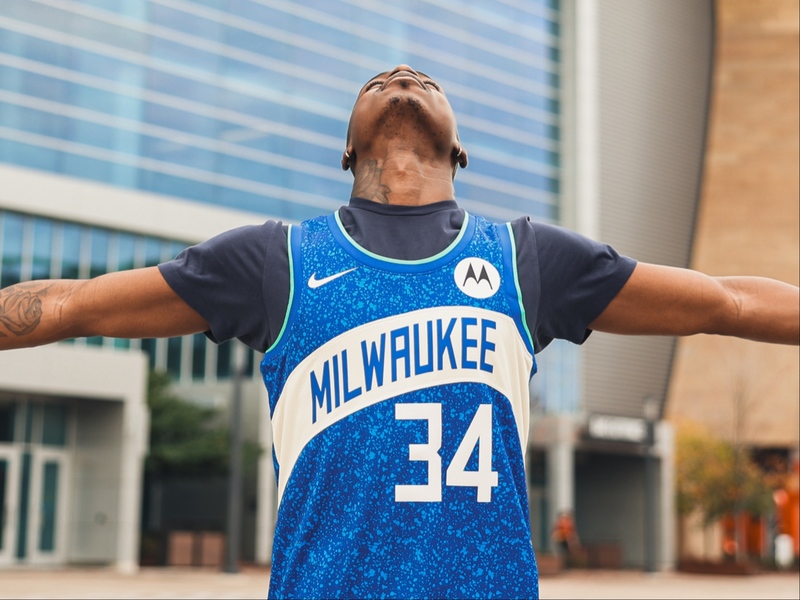It was halftime of Milwaukee’s Dec. 9 contest against Atlanta, the home squad was ahead by 20 points and R&B star Montell Jordan was singing his 1995 hit single, "This Is How We Do It."
The Bucks, winners of five of their previous six games – their best such stretch in nearly two years, with the only defeat during the current run a one-point loss at the last second to the NBA’s second-best team – were sitting in fifth place in the Eastern Conference and seeing the two faces of the franchise playing the best basketball of their fledgling careers. They were finishing a four-game, six-night homestand, with each event having drawn at least a 75-percent capacity crowd, a legitimate accomplishment in a city that hasn’t had many reasons to cheer its pro team over the past 15 years. And, down on the BMO Harris Bradley Center floor, Jordan was tweaking his Grammy-nominated lyrics to sing, "Milwaukee does it like nobody does/Go young Bucks, go young Bucks, go!"
In short, it felt like the Bucks were having a moment.

Then they came out after the half and gave up 40 points in the third quarter to an Atlanta team that resides in the league’s bottom third in scoring, shrinking their lead to eight and stifling what had been a raucous atmosphere. Going into the fourth quarter, the Bucks’ in-game entertainment squad – dressed as video game characters, in the cheerleaders’ case as Princess Peach, for the niche 90s-themed Flashback Friday – tried to revive a fan base suddenly sitting stunned and silent.
With 6:26 remaining in the game, rising star and recent King-slayer Giannis Antetokounmpo picked up his fifth foul – he’d battled the refs’ whistles all night long and struggled to find his usual rhythm – and the latest call sent him to the bench with the Bucks up 99-92. Over the next three minutes and 11 seconds, with Antetokounmpo off the court, the Hawks went on a 13-4 run and took a 105-103 lead, their first since early in the opening quarter.
It felt like the Bucks were having another moment.
Milwaukee head coach Jason Kidd called a timeout with 3:15 left and reinserted the Greek Freak, but the tide had turned. Atlanta prevailed 114-110, having scored 70 second-half points to overcome its huge deficit, and afterward the Bucks were left shaking their heads, disappointed at the collapse.
"Just a total letdown at both ends. I can't even point to one thing," said center Greg Monroe. "Especially at home, you're up by 20 in the first half. It just can't happen. We just relaxed, basically."
Said Kidd, "We didn’t come out with that same intensity in the second half; they did. When the ball moves, we’re at our best, and when the ball sticks, we’re just as bad as anyone. Our defense as a whole was bad in the second half."

After the news conference was over, Kidd tossed his box score sheet aside and walked out of the interview room. The team, especially the players in a hastily-emptied locker room, had a flight to board to Washington, where they’d play the next day, before traveling on to Toronto.
It wasn’t the moment the Bucks were hoping for, nor the one it felt like they were having just an hour earlier. Milwaukee would lose to the underwhelming Wizards on Saturday and be routed by the Raptors on Monday, despite a couple more impressive performances by Antetokounmpo (29.0 points, 10.5 rebounds, 6.0 assists averaged between the two games).
The Bucks were back under .500 at 11-12, with an imposing upcoming schedule and frustratingly familiar questions to revisit about consistency, coaching decisions, late-game execution, 3-point defense and the basic ups and downs of a young team trying to learn how to succeed in the NBA.
Milwaukee began last week on a four-game winning streak, then barely lost to the NBA's longtime standard-bearer and beat one of last year's Western Conference Semifinal playoff teams. It begins this week having lost three in a row and four of its last five, looking little like that recent squad. What happened?
*****
I approached this recent homestand looking to write something about the Bucks that didn’t focus exclusively on Giannis Antetokounmpo – the affable Freak, the point-forward fulcrum of everything Milwaukee seemingly is and is not able to do on the basketball court – and for a few games that genuinely seemed possible.
Antetokounmpo was very good against Brooklyn, San Antonio and Portland, averaging 17.7 points, 11.0 rebounds, 6.3 assists, 3.3 blocks and 2.0 steals per game, but there were other important, emerging storylines: Jabari Parker elevating his increasingly well-rounded offensive game above explosive dunker, a group of reserves with well-defined roles comprising one of the better second units in the league, the precocious play of second-round rookie Malcolm Brogdon, the defensive prowess of the starting backcourt of Matthew Dellavedova and Tony Snell, the redemption of Michael Beasley and the team’s exuberant chemistry. Even the steady if utterly unspectacular (the latter of which Bucks fans are happy to tweet about) 22-minute functionality of Greg Monroe off the bench was worth noting, particularly as a likely trade candidate who only recently had been a frequent DNP-CD.
Then Friday happened, and I was reminded just how integral Antetokounmpo, who signed a four-year, $100 million contract extension a few months ago, is to the Bucks. It would be reductive, probably, to say that the "one thing" Monroe couldn’t point to in ascribing blame for the Atlanta loss was Antetokounmpo. Basketball is the ultimate team sport, Milwaukee has plenty of auxiliary talent and had been playing well, while Atlanta had lost 10 of its previous 12. By halftime, it was the easiest sort of win there is to wrap up in such a difficult league.
But games like the one against the Hawks – when Antetokounmpo was already having an off night before becoming mired in foul trouble and was still seven points better than the next Milwaukee starter in net plus-minus when he was on the court – are perhaps also proof positive that he is already that singular superstar. The kind that, if the right pieces are placed around him, can be the best player on a championship-contending team.
After the 97-96 loss to the Spurs on Dec. 5, Dellavedova, who played with LeBron James for three seasons in Cleveland before signing a four-year, $38 million free-agent contract with Milwaukee over the summer, was asked – with plenty of careful qualifiers built into the question – if it was at all possible to compare Antetokounmpo to James, especially in the wake of the former dropping 34, 12 and 5 on the latter in a Bucks victory a couple weeks prior.

"I don’t think you should be making comparisons between him and LeBron," Dellavedova said. "First, it’s unfair to Giannis because he’s his own player. He’s his own very, very special talent. He’s obviously very unique in his size and athleticism and the things he can do on both ends of the floor.
"He’s got a lot of room to improve but he’s already doing great things on both ends of the floor. He’s flying around getting blocks, steals, moving the ball, making plays. He’s going to be a great, great player for years to come but he’s already special right now, so it’s going to be exciting."
But we already knew that, and the highlight shows and breathless national exposure had pretty much confirmed it. What else did we find out during the most interesting week so far of Milwaukee’s 2016-17 season?
*****
The Bucks began their four-game homestand against the hard-trying and hapless Nets on Dec. 3, and they were much more than just Antetokounmpo. Six players scored in double figures, led by left-hook-loving center John Henson’s 20 points and Dellavedova’s season-high 18, and Milwaukee’s 47.1 percent shooting from the field helped mitigate its 6-of-24 output from behind the arc. The lane-assaulting Bucks, second in the league in the category, scored 62 points in the paint.

Despite a second-half slide – they let a 16-point third-quarter lead slip away to a one-point deficit in the fourth – the Bucks still triumphed, 112-103.
Afterward, Kidd said he thought the game "got a little sloppy," but he "wanted to see if they were going to figure it out." He wasn’t going to call a timeout. "I wanted to see if they were going to talk themselves through it because that's what good teams do," the coach said. And with a home-court and talent advantage over one of the NBA’s worst teams, that seemed like a merited, constructive approach.
Going into its Dec. 5 showdown against San Antonio, Milwaukee was riding a four-game winning streak – its longest in more than a calendar year. Beforehand, Gregg Popovich, the decidedly non-effusive Spurs coach, was – for him – practically gushing about Antetokounmpo.
"Each summer he adds to his game. He’s not just an athlete anymore; he’s not just a phenomenon with his length and athleticism," Popovich said. "He’s learned how to play the game. He’s learned about time and score. He’s learned how to play with his teammates. All of those things are what make you an NBA star as time goes by."
The crusty coach even compared Antetokounmpo’s growth to that of Kawhi Leonard, the bona fide Spurs star who has – quietly but diligently – developed into an All-NBA First Teamer and two-time Defensive Player of the Year.
Then during the game, which wasn’t quite a sellout despite the premier opponent and it being one of the Bucks’ excellent Milwaukee Mondays, Antetokounmpo blocked the mess out of a Leonard runner, briefly pausing to admire the play and rousing the crowd. At another point in the first half, as the Bucks took a 48-35 lead thanks to a near-perfect 24-9 second quarter, Antetokounmpo bounded out in transition, nimbly Euro-stepped through traffic and gracefully finger-roll finished at the rim, a futuristic play that appeared to be a gift from a more glorious and advanced basketball civilization.
But after a concert by local rapper IshDARR, Milwaukee suffered another one of its recurrent second-half letdowns. With Antetokounmpo and Henson battling down low against Spurs big men LaMarcus Aldridge and Pau Gasol – length versus strength – Giannis got into foul trouble and had to sit for much of the critical fourth quarter. But in his absence, Parker got going.
Before the game, Popovich had praised Parker too, saying, "He seems to be somebody who is unbelievably active. He’s willing, he’s very aggressive. The fire and dynamism and everything is there. It’s defining in a more precise manner exactly what he does best and what he wants to do consistently night after night after night."
Parker, who is now almost two full years removed from the ACL tear he suffered in his rookie season, plays like he’s being controlled by someone in NBA 2K who never lets go of the turbo button, bulling through the defense and bouncing explosively toward the basket. It’s a buoyant sort of recklessness. Popular, too.

Once, Antetokounmpo missed a driving layup and Parker boarded and put it back; later Jabari missed a layup and Giannis soared in to clean up and slam it home. There is real concern – and suggestive statistics – about whether the two rising stars can effectively play together, but there’s no question about their connection and scintillating athletic potential.
Parker finished with a game-high 23 points, plus eight rebounds. He made all 10 of his free throws and with 5:39 remaining, he hit a 3-pointer that tied it at 85. Recently given the opportunity to initiate the offense, Parker has shown the ability to be more of a playmaker.
"I thought Jabari did a really good job of picking up Giannis when he got in foul trouble," Kidd said afterward. "I thought Jabari played a really good game from start to finish."
Near the end of the third quarter, Beasley, who’d come to the defense of Monroe, was ejected for a scuffle – along with San Antonio’s Dewayne Dedmon – that stirred the crowd, which cheered the fiery forward as he walked to the locker room.
For nearly 12 minutes, from midway through the third quarter until midway through the fourth, Kidd didn’t call a timeout, while the Spurs made their critical run to take the lead. Still, the Bucks had a chance on the final play for the win, with Antetokounmpo dishing to Dellavedova, who found Mirza Teletovic in the corner for an open 3-point look that clanged off the rim as the buzzer sounded.
Despite the disappointment of not defeating a top-three NBA team for the second time in a week, it did feel something like a moral victory, perhaps a moment. At the very least, a teaching opportunity for Kidd.
"You can also grow from losing too," the coach said afterward. "Going through the experience of a close game, you can learn from your mistakes, and I think tonight we learned a lot from our mistakes. Coming down the stretch, being able to move the ball, making plays for one another to where someone gets a wide-open shot."
The Bucks have, in the past, had trouble executing late in games, but Teletovic afterward called it "a great play." I asked the 31-year-old, who had 11 points and hit three 3s in 21 minutes but would not appear in the next two games, how this team felt compared to others on which he had played.
"I mean, Giannis and Jabari, I can’t really call them young guys, they’ve been in the league for a while now," Teletovic said. "They have been given a lot of trust and they are paying it back, and there’s a lot of pressure on them definitely to play the right way and lead this team, and they’re doing a great job. It’s really difficult to compare this team to any other team, having this talent, and the guys that this team has.
"For me, this is definitely the best team I’ve played on. I've never been on a team that I felt comfortable like this and not just on the court, off the court, the chemistry and I think going forward, this team should be able to do great things."
Dellavedova echoed Teletovic’s comments about Giannis and Jabari’s "great potential" and the team chemistry. He said Bucks players have fun with each other and frequently hang out off the court, which has built on-court trust.
"I think we can feel that we’re playing better," Dellavedova said of whether he thought the team was taking a major step forward. "It’s a pretty simple formula for us: it’s defending hard, rebound, run and move the ball, and when we do that, that’s when we’re at our best. And it definitely starts on the defensive end. But we can’t be happy just to win four, lose one, you know?"
*****
On Dec. 7, one day after Antetokounmpo’s 22nd birthday, Milwaukee hosted Portland, a similarly situated young team hovering above .500 in the Western Conference. It was not a marquee opponent and there was no special promotion; just a midweek affair against a spunky opponent with a dynamic backcourt – the kind of game won by teams that want to be good.
Beforehand, Trail Blazers coach Terry Stotts, a former assistant and head coach for the Bucks, talked about why Milwaukee, young and unique, has had success against some of the best squads in the NBA.
"They’ve played Toronto, Golden State, San Antonio and Cleveland, and they’ve played them all good games," Stotts said. "They’re a tough team to match up with. They have so much length and versatility at both ends of the court." Indeed, the Bucks have drawn national attention from commentators, who say their unconventionality can be an asset, perhaps even in this copy-cat, supposedly shooting-imperative league.
Stotts also said Antetokounmpo had a "very bright future" because "he is such a unique player that can do so much." The versatile Freak proved that point against Portland, with an all-around effort of 15 points, 12 rebounds and 11 assists, his seventh career triple-double – second-most in franchise history behind Kareem Abdul-Jabbar's eight – along with four blocks and two steals. He showed he's as dangerous in transition defense as he is on offense, using timing, positioning and his physical gifts to shut down opponents on the break.
Parker also did his thing, which that night included vicious crossovers, angry attacks on the basket resulting in thunderous dunks and finishes with either hand, as well as a few midrange jumpers and a clutch 3-pointer. He finished with 27 points on 11-of-23 shooting, and afterward Antetokounmpo said of his teammate, "Jabari is a beast right now."
Meanwhile, the non-Gianbari contingent of the team contributed in its own ways. Dellavedova hit three 3s and chipped in 17 points; Monroe, who’s deliberate to the point of being almost effectively slow, had 15 points and four rebounds, all of which essentially fell into his upstretched arms; Brogdon made all three of his 3-point attempts and scored 13; and the enigmatic but endearing Beasley boarded with ferocity, finishing with 12 points and eight rebounds, seeming to alternate between awesome plays and face-palming mistakes every possession.
In the fourth quarter against Portland, Milwaukee risked another of its late folds. The Bucks rely so heavily on their potent transition game they sometimes resemble a pickup team in which everyone wants to dribble the ball up the court and run the offense. But down the stretch, when they need to slow it down and play in the half court, they’re not always able to execute an efficient set – like a pass-happy football offense that struggles to run the ball and eat up clock late in the game.
With 4:16 left, the Blazers got to within 101-99. But despite Kidd not calling a timeout the rest of the way, Milwaukee – thanks in large part to baskets by Dellavedova and free throws by Antetokounmpo, who’d earlier been called for a 10-second violation at the line – managed to pull out the win. It was a lesson learned, ostensibly, after not closing out a similar game it had led most of the night against the Spurs.
"We were in that situation with San Antonio with it being a close game," Kidd said afterward. "We didn't turn the ball over coming down the stretch. This group tends to pay attention to their mistakes and quickly make the adjustment."
Still, there were areas of apprehension. Not calling a timeout had worked, but does the let-them-figure-it-out approach – clearly a conscious Kidd strategy – necessarily befit a young group that still needs instruction? There were other questions about the rotation: Why was veteran Jason Terry still playing so much despite poor 3-point shooting, which is his main skill? Why did Rashad Vaughn, recently recalled from the D-League, receive time, while Teletovic, who’d played well against the Spurs, got a DNP-CD? Would we ever see Miles Plumlee again?
Was the 3-point defense, heretofore holding opponents to a NBA-best .311 shooting percentage from distance, regressing after allowing Portland to make 17 of 40 attempts? And were Giannis’ foul problems a bigger issue?
*****
Before Montell Jordan started singing, before the game against the Hawks tipped off, before the first 10,000 fans at the Bradley Center received a complimentary stadium cup, Kidd spoke with reporters about the bunched-up Eastern Conference standings, where the Bucks were in fifth place with an 11-9 record and the Hawks were in 10th at 11-12.
"(We need to be) understanding of how important games are early in the season," Kidd said. "You don’t want to give any away, because it’s always hard to make those up."
Indeed.
It all started well enough, with Milwaukee resisting Dennis Schroder’s 17-point outburst in the first quarter. With Antetokounmpo picking up three early fouls and playing only 10 minutes, Parker displayed an array of dunks, layups, hooks and jumpers, and Monroe scored and distributed nicely from the low post. The Bucks shot 8 of 13 on 3-pointers in the first half, including 3 of 4 by Terry, who’d made just 29 percent of his long-range attempts coming into the game.
The mascot was being slingshot down the court into a bunch of bowling pins, as video-game characters around him cheered. The Bucks, leading 64-44 at halftime, were rolling.
And then things fell apart. Despite 49 points from the bench – composed of Beasley, Brogdon, Monroe and Terry in a nine-man rotation – it seemed like Parker and nobody else on offense. Defensively, Milwaukee allowed Atlanta to shoot 62 percent in the third quarter, the Hawks more than doubled up the home team in free throw attempts and makes and, in a rare occurrence, the Bucks were outscored in the paint, 52-46.
Teletovic once again didn’t see the court, nor did Plumlee for the fourth straight game. Dellavedova and Snell shot a combined 5 of 17 from the field, while Antetokounmpo committed six turnovers to just one assist. Parker finished with 27 points, making 3 of 7 attempts from 3-point range. But Schroder scored 33 and Paul Millsap added 23, Atlanta hit 35.3 percent of its 3s, and the Hawks played with more poise and confidence toward the end of the game.
From the 7:45 mark of the third quarter, when the Bucks were up 67-57, until the 4:52 mark of the fourth quarter, when the lead was 102-99 – nearly 15 minutes of game time – Kidd did not call a timeout. With its leader and best player, Antetokounmpo, on the bench for much of that time, Milwaukee looked lost and uncertain.
I asked Kidd about his philosophy on timeouts and whether he wished he’d used one earlier against Atlanta.
"I believe when they’re in trouble and need help I will call a timeout," Kidd said. "Understanding that the game of basketball is about runs, and tonight looking at the second half, they had a lot more runs than we did; we had the runs in the first half. For a young team, you have to figure it out."
Kidd then added, "We shot four 3s coming down the stretch, so calling a timeout is not going to do anything, because they had already determined that they were shooting the 3. That’s something that we’ve got to get better at, is we don’t need to rely on 3 when we’re only up one or down one." Presumably, a good time to deliver such a message to his players would be during a timeout, but Kidd did not take a follow-up question.
As for Antetokounmpo’s foul trouble, it does appear to be a real issue. In 23 games this season – including the subsequent losses at Washington and Toronto – Antetokounmpo has committed at least four fouls 17 times. In those games, the Bucks are 7-10, including 2-6 when he’s whistled for five or more. When he commits three or fewer fouls, Milwaukee has a 4-2 record.
Giannis averages 34.5 minutes. When he plays less than that, the Bucks are 5-3; when he plays more, they are 6-9. So the results seem to correlate less with Antetokounmpo playing fewer minutes than with him perhaps tamping down his aggressive style of play.
"Foul trouble has bothered him and he has to learn how to play with fouls. We’ve got to look at some of the fouls he’s committing," Kidd said after the Hawks game. "The best way to learn is to go through it. There’s no magic; I’m not a magician. He’s got to go through it. Everyone in that locker room has to go through it and learn to play with fouls and understand it’s about wins, it’s not about stats, and once we get to that level, we’ll be good.
"We made some mistakes coming down with timeouts, turnovers – something that we haven’t done – so we have to get better. There’s going to be mistakes, the game of basketball is about mistakes; we’re a young team, we’re going to make a lot of them. But we tend to correct them and we tend to move forward, so hopefully we can do that."
A couple hours after the loss to the Hawks, a Bucks fan I'd never met before named Jason Peterson sat at a bar on Old World Third Street and tried to encapsulate his feelings. "It's the same old Bucks. Up, down, up, down, good, bad, good, bad. At least they're young and fun now, I guess." That seemed overly simplistic, but not quite wrong.
After allowing 122 points Monday to the Raptors – the Bucks’ fourth consecutive game giving up at least 107 – Kidd said, "We just didn't put up any resistance; our defense was non-existent." Only a few days after leading the league in opponent field-goal and 3-point shooting, Milwaukee had fallen to fourth and third in those categories, respectively.
Last week, the Bucks had won four games in a row. Now, they’ve lost four of their last five heading into a home-and-away series with the Chicago Bulls on Thursday and Friday. After that, they’ve got another such back-to-back series against the Cavaliers, who will surely be looking to revenge their embarrassing defeat in Milwaukee.
The moment the Bucks could have had last week never happened. It's nothing supernatural, of course; it just didn't happen. This continues to be a young team with huge potential and definite flaws, prone to brilliant moments and vexing breakdowns. It’s an exciting, unorthodox and inconsistent bunch that flouts NBA convention and is impossible to ignore. "Milwaukee does it like nobody does."
Time to make another moment.





Born in Milwaukee but a product of Shorewood High School (go ‘Hounds!) and Northwestern University (go ‘Cats!), Jimmy never knew the schoolboy bliss of cheering for a winning football, basketball or baseball team. So he ditched being a fan in order to cover sports professionally - occasionally objectively, always passionately. He's lived in Chicago, New York and Dallas, but now resides again in his beloved Brew City and is an ardent attacker of the notorious Milwaukee Inferiority Complex.
After interning at print publications like Birds and Blooms (official motto: "America's #1 backyard birding and gardening magazine!"), Sports Illustrated (unofficial motto: "Subscribe and save up to 90% off the cover price!") and The Dallas Morning News (a newspaper!), Jimmy worked for web outlets like CBSSports.com, where he was a Packers beat reporter, and FOX Sports Wisconsin, where he managed digital content. He's a proponent and frequent user of em dashes, parenthetical asides, descriptive appositives and, really, anything that makes his sentences longer and more needlessly complex.
Jimmy appreciates references to late '90s Brewers and Bucks players and is the curator of the unofficial John Jaha Hall of Fame. He also enjoys running, biking and soccer, but isn't too annoying about them. He writes about sports - both mainstream and unconventional - and non-sports, including history, music, food, art and even golf (just kidding!), and welcomes reader suggestions for off-the-beaten-path story ideas.







